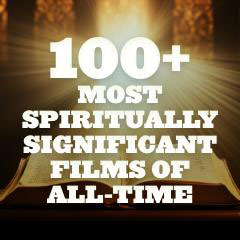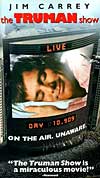
|
Top 100 Spiritually-Significant Films Part 4 |

|
(Part 4, ordered alphabetically by original title with year of release and director) |
|
76. Smultronstället ("Wild Strawberries"), 1957, Ingmar Bergman An allegorical film about Isak Borg (legendary silent film actor and Scandinavian director Victor Sjostrom), a 78 year-old widowed medical professor, who reassesses his heartless, constrained and cold life while on a car trip from Stockholm to his former university in Lund to receive an honorary degree. He travels with his estranged, pregnant daughter-in-law Marianne (Ingrid Thulin), and revisits (both in his imagination and literally) many of the landmarks of his past (his summer home, the home of his mother) that bring up long-lost memories and a reminder of his onetime, long-departed sweetheart Sara (Bibi Andersson). |

|
|
77. Solyaris ("Solaris"), 1972, Andrei Tarkovsky A science-fiction film that won the Grand Jury Prize at the 1972 Cannes Film Festival. This visually-striking film serves as a fable about love, humanity, man's fears, fantasies and the objectification of memories from the past. A widowed psychologist and cosmonaut Kris Kelvin (Donatas Banionis) embarks on a space mission to a space station orbiting a water-dominated planet called Solaris to investigate the mysterious death of a doctor, Gibarian (Sos Sarkissian). When he becomes re-acquainted with his suicidal ex-wife (dead for seven years), Khari (Natalya Bondarchuk) during his mission to this strange planet, he is forced to reexamine the nature of the alternate reality of alien intelligence. |

|
|
78. Stalker, 1979, Andrei Tarkovsky Another allegorical science-fiction film from Tarkovsky about the human soul and spiritual longing, adapted from the novel Picnic by the Roadside by brothers Boris Strugatsky and Arkady Strugatsky. Three men, the Writer (Nikolai Grinko) - a burned-out and cynical author, the Scientist (Anatoliy Solonitsyn) - a quiet individual, and the Stalker (Alexander Kaidanovsky) - an experienced hired guide, journey treacherously through the Zone (a mysterious, war-ravaged, post-apocalyptic forbidden wilderness area), toward the metaphorical Holy Center or inner chamber called the Room, to have their deepest wishes fulfilled. |

|
|
79. Star Wars, The Empire Strikes Back, Return of the Jedi, 1977, 1980, 1983, George Lucas, Irvin Kershner, Richard Marquand The famed trilogy beginning with the opening words of the first installment, “A long time ago, in a galaxy far, far away…”. |

|
|
80. Stevie, 2002, Steve James A self-indulgent, downbeat documentary about director Steve James' 1995 painful return to rural Southern Illinois to reconnect with Stevie Fielding, a deeply-troubled, abandoned, and sexually-abused 11 year-old boy from a dysfunctional family in Pomona, Ill. James had been his 'Advocate Big Brother' ten years earlier when a student at SIU. Now years later, the grown and self-destructive Stevie has gone further downhill, is tattooed and bearded, with a lengthy criminal record. |

|
|
81. The Straight Story, 1999, David Lynch David Lynch's old-fashioned, heartwarming chronicling of a long journey in 1994 - by riding tractor/mower -- of 73-year-old Alvin Straight (Richard Farnsworth) from Laurens, Iowa, to Mt. Zion, Wis., to mend his relationship with his ill, estranged, 75-year-old brother Lyle (Harry Dean Stanton). |

|
|
82. Sunrise: A Song of Two Humans, 1927, F.W. Murnau An expressionistic silent film classic with imaginative cinematography, and the most expensive silent film Fox ever produced. An elemental film about a Man (George O'Brien) and his innocent Wife (Janet Gaynor, Best Actress Award winner), a young farm couple representative of the simple pastoral life, and a vampish woman (Margaret Livingston) from the sinful city, with bobbed hair and smoking a cigarette, who tempts and seduces the man to drown his wife and run away with her. The film won the Academy Award for Artistic Quality of Production—a category dropped immediately afterwards. |

|
| The Sacrifice, 1986, Andrei Tarkovsky - see Offret—Sacrificatio | |
|
83. Sånger från andra våningen ("Songs From the Second Floor"), 2000, Roy Andersson An absurdly surreal film that won the Special Jury Prize at the Cannes Film Festival. It traces, through plotless vignettes, the empty, unfulfilled lives of several characters in the new millenium gridlocked with traffic in the broken-down modern capitalistic society, among them Kalle (Lars Nordh) - a furniture merchant who has just torched his store, a bitter crucifix salesman, and an elderly magician who successfully saws his subject in half. A film poem inspired by early-20th-century Peruvian Communist poet César Vallejo, with the enigmatic refrain: "Blessed be the one who sits down". |

|
| The Son, 2002, Jean-Pierre & Luc Dardenne - see Le Fils | |
|
84. The Sweet Hereafter, 1997, Atom Egoyan A compelling, emotionally-provocative story about death and healing. It tells about a tragic school bus accident (that kills fourteen children) on a cold, winter day in isolated Sam Dent, British Columbia, and how the incident affects the small Canadian community, with the tagline: "There is no such thing as the simple truth." Nicole Burnell (Sarah Polley), a teenaged musician who survived the crash but without the use of her legs, is persuaded by ambulance-chaser lawyer Mitchell Stephens (Ian Holm) to plead her case. |

|
|
85. Tender Mercies, 1983, Bruce Beresford Set in the East Texas countryside, alcoholic, broke former country singer Mac Sledge (Robert Duvall, Best Actor winner), who bonds with young widow Rosa Lee (Tess Harper) and her son Sonny (Allan Hubbard), and is inspired to resume his washed-up career. From a script by Horton Foote. |

|
|
86. Trois Coulers: Bleu, Trzy Kolory: Bialy, Trois Coulers: Rouge ("Three Colors: Blue, White, Red"), 1993, 1994, 1994, Krzysztof Kieslowski A three-film collection of stories about contemporary French society based upon the 3-colors of the French flag. Three distinct stories with the themes of liberty, equality, and fraternity. Blue tells about composer Julie Vignon (Juliette Binoche) who loses her family (her composer-husband and 5-year-old daughter) in a car crash. White tells of Paris-based Polish expatriate Karol (Zbigniew Zamachowski) who has lost everything. Red tells the story of Valentine (Irene Jacob), an unlikely fashion model in Geneva, Switzerland. |

|
|
87. Tokyo Monogatari ("Tokyo Story"), 1953, Yasujiro Ozu A great classic film of world cinema about the inevitability of change and its acceptance - the poignant, simple story of an elderly couple, Shukishi (Chishu Ryu) and his wife Tomi (Chieko Higashiyama), who journey by train from their peaceful, country province to their middle-class children's homes in bustling Tokyo. Only one of their selfish, ungrateful grown-up children are interested in them - widowed daughter-in-law Noriko (Setsuko Hara). |

|
|
88. The Truman Show, 1998, Peter Weir A thought-provoking story about consumeristic voyeurism, loss of privacy and media surveillance. A good-natured insurance salesman/adjuster named Truman Burbank (Jim Carrey) discovers his entire life (of 30 years) was actually a TV show, choreographed and filled with actors (wife Meryl - Laura Linney), and directed by charismatic 'televisionary' Christof (Ed Harris). He lives in the biospheric planned community of Seahaven built in an enormous soundstage, and discovers that he is being filmed - and imprisoned. |

|
|
89. Unforgiven, 1992, Clint Eastwood A dark, revisionistic Western that was a Best Picture and Best Director winner - about a retired, widowed Old West gunslinger, now a Kansas hogfarmer named William Munny (Clint Eastwood) who reluctantly takes on one last bounty-hunting job, with the help of his old partner Ned Logan (Morgan Freeman) and a braggart named the Schofield Kid (Jaimz Woolvett). He confronts brutal Sheriff Little Bill Daggett (Gene Hackman) in 1880's Big Whiskey, Wyoming. |

|
|
90. Il Vangelo Secondo Matteo ("The Gospel According to Matthew"), 1964, Pier Paolo Pasolini A recounting of the life of Jesus Christ as told according to the Gospel of Matthew (the film follows Matthew’s dialogue almost verbatim), but told in neo-realist style by devout Marxist, athiest, and homosexual Pasolini, an Italian film-maker. Condemned at the time of its release as an anti-religious film, this work was shot in southern Italy in poor slums with non-professional actors, and without sentimentality, preaching, or glorification of the subject matter. |

|
|
91. Vanya on 42nd Street, 1994, Louis Malle A retelling of Anton Chekhov's Russian classic Uncle Vanya about loneliness and wasted lives. The film was derived from a 1988 adaptation by playwright David Mamet, often staged since 1989 by director Andre Gregory. New York actors of the theatrical cast rehearse Chekhov's "Uncle Vanya" in a rundown theater, appearing on the bare stage of the New Amsterdam Theater on Times Square. It was filmed with most of the original cast, including Wallace Shawn as the defeated and failed academic Vanya, his father-in-law Serybryakov (George Gaynes) and Julianne Moore as his beautiful young wife Yelena. |

|
|
92. Le Vent souffle où il veut ("A Man Escaped"), 1956, Robert Bresson A tension-filled, suspenseful film based on a true story about bondage and rebirth, from the memoirs of Andre Devigny, a French Catholic Resistance activist. The protagonist in the film is named Lieutenant "Fontaine" (François Leterrier), who is imprisoned by the Nazis in an internment camp, and sentenced to death by the Gestapo during the occupation. He plans an elaborate escape from his tiny prison camp cell, and then on the day he is condemned to death, a new cellmate - a 15 year-old French boy - is introduced. Is he an informant? |

|
|
93. La Vita è bella ("Life is Beautiful"), 1997, Roberto Benigni A life-affirming WWII romantic comedy-tragedy fable about love, family, and sacrifice, from actor/director Benigni - and the Grand Prix winner at the 1998 Cannes Film Festival. Guido (Benigni), a bumbling Jewish waiter (and bookseller) courts a schoolteacher named Dora (Nicoletta Braschi, Benigni's real-life wife) in the film's first half set in Tuscany in 1939. When sent to a concentration death camp a few years later, Guido shelters his young 5 year-old son Giosue (Giorgio Cantarini) from the horrors to come, by making it a game - the competition's top prize is a tank. |

|
|
94. Vredens dag ("Day of Wrath"), 1943, Carl Theodor Dreyer Dreyer's haunting political allegory and melodramatic examination of religious persecution, forced confessions, and killings, adapted from Hans Wiers-Jenssens' novel "Day of Wrath". In a 17th-century Danish village, an elderly woman is accused of witchcraft and burned at the stake, while presided over by an elderly parson named Absalon Pedersson (Thirkild Roose). The pastor's young second wife Anna (Movin), in a loveless marriage, falls in love with his newly returned son Martin (Lerdorff Rye). Her confession of this illicit affair to her husband brings on his death, and leads to her condemnation as a witch by the intolerant society. |

|
|
95. Waking Life, 2001, Richard Linklater An off-beat, fresh, rambling, dream-like creatively-imaginative animated film (originally a live-action film that was later painted with a computer process) that follows the disconnected thoughts and inner discussions of the nameless main character (Wiley Wiggins). Accused of being pseudo-intellectual, this free-floating unique film presents a collage of images as it philosophically contemplates the illusionary nature of reality. |

|
|
96. Werckmeister Harmonies, 2000, Béla Tarr A challenging, powerfully-stark black and white film adapted from Laszlo Krasznahorkai's novel "The Melancholy of Resistance," about loneliness, despair and spiritual longing. When a circus (actually a large van with an exhibit of an enormous stuffed whale inside with an unseen silhouetted Prince figure) arrives in a bleak, unnamed Eastern European town (presumably in the Hungarian plains), blank-faced lonely postal worker Janos Valushka (Lars Rudolph), the town's resident holy fool, imagines God's power reflected in the whale. The presence of the circus in town incites the populace to a strange, somnambulist uprising of violence and looting. |

|
| The Wind Will Carry Us, 1999, Abbas Kiarostami - see Bad ma ra khahad bord | |
| Wings of Desire, 1987, Wim Wenders - see Der Himmel über Berlin | |
|
97. Witness, 1985, Peter Weir The first Hollywood film of the Australian director Weir. Both a love story and a thriller, about a hardened Philadelphia police officer named John Book (Harrison Ford) who must hide out in a self-sufficient Amish community in Pennsylvania in order to protect a young Amish boy named Samuel (Luke Haas) who witnessed a murder in the Philadelphia train station. The ways of the fiercely independent people who distrust outsiders provides a counterpoint to the love that develops between the pretty Amish widow Rachel (Kelly McGillis) and the modern-day cop. |

|
| The Word, 1955, Carl Theodor Dreyer - see Ordet | |
|
98. The Year Of Living Dangerously, 1982, Peter Weir A story of political upheaval, divergent cultures, loyalty, betrayal, ambition, and morality, embedded in a love story. The first overseas assignment of shallow yet ambitious Australian journalist Guy Hamilton (Mel Gibson) is in Indonesia in 1965. Hamilton is 'adopted' by dwarfish Eurasian photographer Billy Kwan (Oscar-winning, cross-gendered Linda Hunt) and introduced to British consular official Jill Bryant (Sigourney Weaver) with whom he promptly falls in love. She gives him secret information regarding an arms shipment to the Communists so that they can escape the predicted war together, but Hamilton unwisely uses the information for an exclusive story and puts their lives in jeopardy. |

|
|
99. Yi yi ("Yi Yi: A One and a Two"), 2000, Edward Yang An intimate, multi-layered three-hour middle-class family drama set in contemporary Taipei, with themes of love, sorrow, pain, choice, the desire for connectedness, and regret. Each member of the Jian family asks hard questions about life's meaning and reexamines their lives. The head of the family is taciturn, self-reflective "NJ" or Ni Jian (Wu Nienjen), a middle-aged executive for a struggling computer firm. At his brother-in-law's wedding (the same time as his mother-in-law's stroke), he reunites with his high school sweetheart Sherry (Ke Suyun), jilted 30 years earlier, and starts to re-evaluate every aspect of his life. |

|
|
100. Zerkalo ("The Mirror"), 1975, Andrei Tarkovsky An intensely-personal, profound, visual, and transcendent meditation on life and lost innocence - the spiritual autobiography of director Tarkovsky's privileged life in a Russian literary family and his career as a state-employed artist. The introspective, haunted work, told without traditional logical order, is directly based on his father Arseny’s poetry, read in voiceover by a faceless narrator (Innokenty Smoktunovsky) as he delivers his words mostly off-screen. Much of the focus is on Tarkovsky's neglected mother, played initially by Margarita Terekhova and, later on, by his real mother. |

|
|
|
|